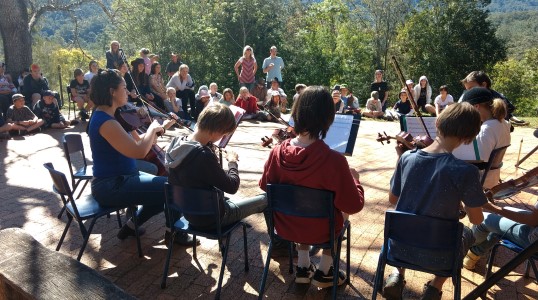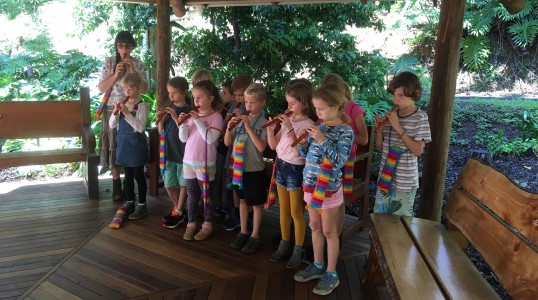“The person that hath no music in him, nor is not moved with concord of sweet sounds, is fit for treason, stratagems and spoils.”
— William Shakespeare
As you walk through the beautiful grounds of Chrysalis School you can hear the sound of music most afternoons. It might be the sounds of singing voices permeating through the trees, the earthy vibrations of beating drums, the entwining melodies of the violin ensemble or the jazzy improvisations of the instrumental ensemble.
Music education at Chrysalis has been developed over many years as a specialist programme that lives deeply within the pedagogy of the whole school and its links to the wider community. Music as a universal phenomenon, a creative subject, a means of expression and an art form has profound interconnections with simple and complex mathematics, geometry, science and creative arts. Simultaneously, it facilitates self-expression, self-discipline, co-ordination and emotional, social and personal growth. Music nurtures and supports the development of thinking, feeling and will as central to Steiner education. The far reaching benefits of music for brain development and indeed educating the whole child, have been extensively researched and in modern times is understood as fundamental to the education of children.
Class Music Program
Music begins in Kindy with singing and body percussion integrated with story, activities, nature and play. The voice is the human instrument utilising the immediacy of body and breath. Singing continues and develops throughout all the classes all the way to the end of Class Eight.
In Class One and Two, recorders are introduced and continue on through the later years. Recorder presents as an extension of fingers and breath.
In Class Three, the violin comes into play as an extension of the physical body crossing the midline with the bow and developing the heart forces and aural recognition.
In Class Four, the majority of children continue violin with some shifting on to viola and cello. Some children at this stage work alternatively on the Marimba. Ensembles in Class Three and Four involve whole class groups.
Specialised Ensemble Program & Instrumental Lessons
The specialised ensemble program starts in Class Five and instrumental tuition choices open up with piano, non-kit percussion and ukulele being offered as instrumental tuition options.
In Class Six, guitar is offered and in Classes Seven and Eight drums, bass and vocal are further added to the options.
Instrumental lessons are re-integrated in an extensive ensemble program where students play their tuition instrument together and work on significant collaborations between ensembles. They are also integrated through festivals, performances and other classroom music.
Children are taught with care and dedication that goes beyond their instrumental lessons into the far reaching interactions of children and music teachers through ensemble sessions and into their general school lives. It also involves significant interaction between students, music teachers and the broader teaching and music community within the school and beyond.
View the 2020 celebration of our music curriculum below:
‘All The Planes Were Grounded’




